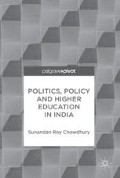Abstract
The use of English in India’s everyday lives varies widely. The head of a large business corporation may use a language other than English only when she speaks to her cook or the driver of her car. At the other extreme, a school teacher of science at a Hindi-medium school in a town in the state of Madhya Pradesh may use English only when she has to deal with a physics syllabus that is written in English or if she wants to read education policy documents emanating from government sources or think-tanks in New Delhi. There are a 100 different gradations of the use and power of English in Indian lives within these two ends of the pendulum. Has India always lived with English, have Indians lived with another such language of power other than English, how long have Indians lived with English, and what has English done to Indians, to their minds, to their education, to their culture, to their economic and social development, to their pursuit of knowledge of sciences and humanities, and to India as a civilization? In this chapter, I try to see the contested growth, complexity, and impact of English education in India from India’s contact with European Christian missionaries, during the period of colonial rule and in post-1947 independent India. I ask, has English done India good, has it been bad for Indians, can India live without English, and if India cannot live without English, how exactly should India live with English? This chapter is divided into three main parts. The first part “India’s British/European Encounter and Indian Higher Education” looks at the development of English and development of the ideas of “development” in India between 1700, when the initial Europe–India encounters began, and 1947, the year of India’s independence from British rule. The second “Independence and After—Language, Education, and Development” sees how higher education policymaking in independent India has created and nurtured the power of English as a Brahminical language and what it has meant for the nature of India’s economic and educational development. The third part, “Concluding or Continuing the Debate,” explores possible alternatives in India’s language policy and what that can mean for alternatives in India’s politico-economic and edu-cultural spheres of development. A postscript offers policy-relevant actionable suggestions in the area of language and development.
Access this chapter
Tax calculation will be finalised at checkout
Purchases are for personal use only
Recommended Readings
Government Reports/Policy Documents
Education Commission. 1970. Education and National Development: Report of the Education Commission (EC). New Delhi: NCERT.
Ministry of Human Resources Development. 1992. National Policy on Education 1986—Programme on Action 1992 (NPE). New Delhi: Government of India.
Ministry of Human Resources Development. 2010. Report of Committee to Advise on the Renovation and Rejuvenation of Higher Education (CARHE). New Delhi: Government of India.
National Knowledge Commission. 2009. National Knowledge Commission—Report to the Nation (NKC). New Delhi.
Prime Minister’s Council on Trade and Industry. 2000. Report on A Policy Framework for Reforms in Education (PFRE). New Delhi: Government of India.
University Education Commission. 1950. Report of the University Education Commission (UEC). New Delhi: Government of India.
Books/Articles/Essays
Barra, Joseph. 1998. Colonialism and Educational Fragmentation in India. In Bhattacharya.
Basu, Aparna. 1974. The Growth of Education and Political Development in India, 1898–1920. New Delhi: Oxford University Press.
Basu, Aparna. 1982a. Essays in the History of Indian Education. New Delhi: Concept.
Basu, Aparna. 1982b. Education of Civil Servants during the Company Period. In Essays in the History of Indian Education. New Delhi: Concept.
Bhattacharya, Sabyasachi (ed.). 1998. The Contested Terrain: Perspectives on Education in India. New Delhi: Orient Longman.
Bhokta, Naresh Prasad. 1998. Marginalisation of Popular Languages and Growth of Sectarian Education in Colonial India. In Bhattacharya.
Dreze, Jean and Sen, Amartya. 2011. Putting Growth In Its Place. Outlook, 14 November 2011. https://www.outlookindia.com/magazine/story/putting-growth-in-its-place/278843.
Guha, Ramachandra. 2009. The Rise and Fall of the Bilingual Intellectual. Economic and Political Weekly 44 (33): 36–42.
King, Robert D. 1997. Nehru and the Language Politics of India. New Delhi: Oxford University Press.
Kumar, Deepak. 1998. Educational Ideas of Bengali Scientists from 1850 to 1920. In Bhattacharya.
Pandey, Gyanendra. 2016. Dreaming in English. Economic and Political Weekly 51 (16): 56–62.
Roy Chowdhury, Sunandan. 2014. Monster Anglopolis. Planet—The Welsh Internationalist, 216.
Author information
Authors and Affiliations
Corresponding author
Rights and permissions
Copyright information
© 2017 The Author(s)
About this chapter
Cite this chapter
Roy Chowdhury, S. (2017). Brahmin Language, Hindu Growth—Politics and Power of English Language in India. In: Politics, Policy and Higher Education in India. Palgrave Macmillan, Singapore. https://doi.org/10.1007/978-981-10-5056-5_2
Download citation
DOI: https://doi.org/10.1007/978-981-10-5056-5_2
Published:
Publisher Name: Palgrave Macmillan, Singapore
Print ISBN: 978-981-10-5055-8
Online ISBN: 978-981-10-5056-5
eBook Packages: EducationEducation (R0)

